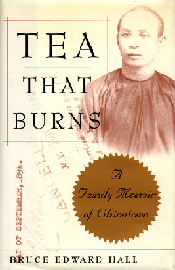

|
Tea That Burns : A Family Memoir of Chinatown (Free Press, 1998)From the book jacket: "Bruce Edward Hall may have an English name and a Connecticut upbringing, but for him a trip to Chinatown, New York, is a visit to the ghosts of his Chinese Ancestors -- Ancestors who helped create the neighborhood that is really as much a transplanted Cantonese village as it is a part of a great American city. Among these Ancestors are missionaries and reprobates, businessmen and scholars. There is the patriarch with three wives (two in China, one in New York), who arrived in Chinatown just as it was beginning to take shape, and who eventually became a key player in the infamous Tong Wars that ravaged the neighborhood at the turn of the century. There is the grandfather, whose nickname, 'Hock Shop,' bespoke his reputation as Chinatown's favorite bookie. There is the dashing aviator whose dogfight in the skies over Brooklyn made him Chinatown's first hero in the war against Japan, and the matriarch who was purchased as a bride for $1,200 when the ratio of Chinese men to women was two hundred to one. And all of them shared the experience of the great-aunt who emigrated to New York at the age of eight months, but lived in fear of deportation for the next fifty years because this country refused to allow Chinese to become American citizens. In Tea That Burns..., author Bruce Edward Hall uses the stories of his family and others to tell the history of Chinatown, New York, starting with the tumultuous journey from an ancient empire ruled by the nine dragons of the universe to a bewildering land of elevated trains, solitary labor, and violent discrimination. The world they constructed was built of backbreaking labor and poetry contests; gambling dens and Cantonese opera; Tong Wars, festivals, firecrackers, incense and food -- always food, to celebrate every conceivable occasion and to confound the ever-meddlesome "White Devils" as they attempt to master the mysteries of chop sticks and sitr-fry. A vivid and tactile story; rich with the sights, sounds, and sensations of Chinatown then and now, Tea That Burns reads like a novel, but is history at its best." Reviews: Smithsonian Magazine, (Emily d'Aulaire, Dec., 1998) "Hall... follows the inevitable Americanization of the Hor family -- which for obvious reasons, changed its name to Hall in 1950... [He] is able to make Chinatown as vividly real to the reader as if he'd lived there since the time of his great-grandfather. With affection rather than mockery, the author describes the supersitions that are a way of life for these gentle people -- gentle when they're not involged with one Tong war or another... [His] narrative soars with his descriptions of the annual succession of joyous parades and celebrations that are the life and breath of Chinatown... At the beginning of his remarkable book, Hall writes, 'This is a tactile history. I want the reader to be able to know what it felt like to live in Chinatown through the years, what it looked like, what it smelled like.' This reader certainly did." The Wall Street Journal, (Pui-Wing Tam, Aug. 7, 1998) "Mr. Hall weaves in rich details of how it might have looked or felt to be in the Chinatown of the time... a fine read..." Kirkus Reviews (June 1, 1998) "The book... is not strictly a family memoir, but a history of the genesis and rapid growth of Manhattan's Chinatown with the stories of the author's predecessors woven into it... The book is at its best when he delves into the early history of Chinatown. Hall crowds his story with colorful characters and anecdotes in a way that is reminiscent of Luc Sante's "Lowlife"... From the turn of the century to the present day, Hall's book accelerates overall to a dizzying pace." Library Journal (D.E. Perushek, June 15, 1998), "Highly entertaining and quite informative, this excellent mix of Chinese tradition and Asian American history reads somewhat like Maxine Hong Kingston with footnotes..." Booklist (Vanessa Bush, Aug. 19, 1998) "Hall's account is an often hilarious, always compelling history of Chinese immigration." Booklist Editor's Choice for 1998. |
|
I Thought My Father Was God; and Other True Tales from NPR's National Story Project, $1,380 Per Night, Double Occupancy Diamond Street: The Story of the Little Town with the Big Red Light District American Heritage A Walk Through Chinatown with My Great Grandfather TimeOut The Forbidden City Also by Bruce Edward Hall | |